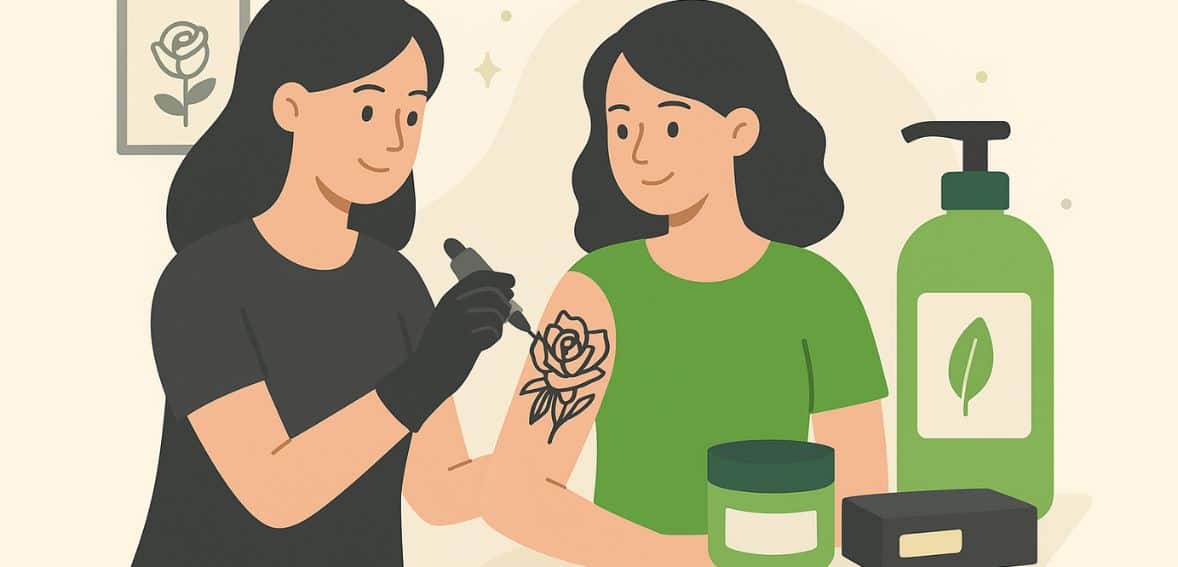
By alphacardprocess September 22, 2025
Because it meets customer expectations, bundling works. When getting a Tattoo, clients want advice on how to care for their new artwork, and they frequently trust their artist’s advice more than information they might find online. Studios show their expertise and guarantee consistent healing results by offering carefully chosen aftercare products in addition to services.
Including branded items such as clothing, accessories, or prints enhances the feeling of community and inclusion. Bundling thus turns a one-time service into a comprehensive experience that goes beyond the actual tattoo session. Because it meets customer expectations, bundling works.
When getting a tattoo, clients want advice on how to care for their new artwork, and they frequently trust their artist’s advice more than information they might find online. Studios show their expertise and guarantee consistent healing results by offering carefully chosen aftercare products in addition to services.
Including branded items such as clothing, accessories, or prints enhances the feeling of community and inclusion. Bundling thus turns a one-time service into an extensive experience that goes beyond the actual tattoo session.
The Evolution of Tattoo Studios into Retail Spaces
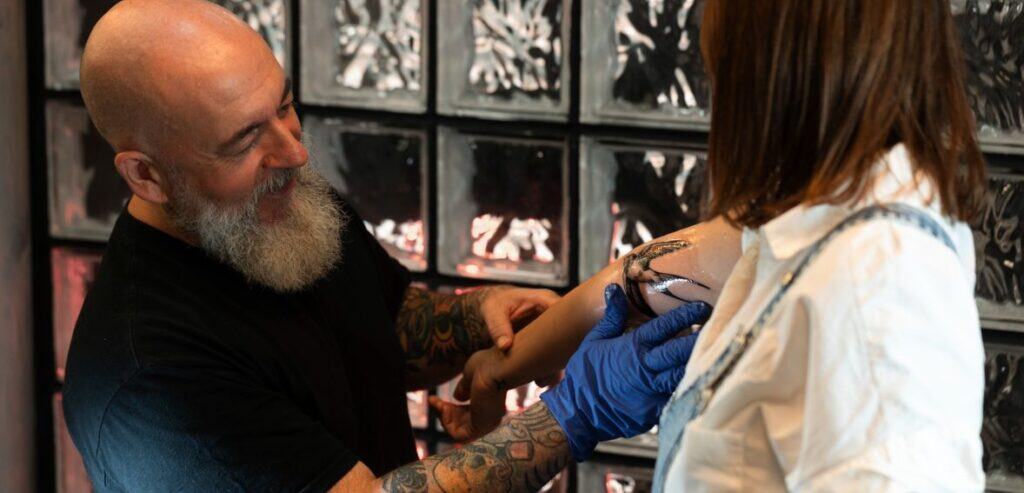
In the past, tattoo studios were mainly service-only businesses that dealt in time and artistry. Although this still serves as the basis, modern studios are developing into retail-inspired areas that meet lifestyle demands.
In addition to getting tattoos, customers come in to experience a culture. The industry’s growing professionalism is one factor driving this change. Studios are establishing themselves as high-end travel destinations by raising the bar for cleanliness, design innovation, and customer service.
It makes sense to offer retail goods like eco-friendly skincare, tattoo balm, and branded apparel as part of this progression. Studios can increase their client touchpoints through merchandising. Even if a client only gets inked once or twice a year, they can still purchase an aftercare product, t-shirt, or hoodie.
This provides a steady stream of revenue that is not tied to appointment availability. Moreover, retail offerings become powerful marketing tools. When clients wear branded apparel or post about the products they purchased, they act as ambassadors, extending the studio’s reach organically.
Merchandising as a Cultural Extension
In addition to aftercare, merch enables tattoo studios to develop closer cultural bonds with their customer base. A limited-edition print or hoodie featuring a shop’s logo turns a tattoo appointment into a long-lasting brand relationship. Identity is at the heart of tattoos, and merchandise serves as a means for customers to show off their affiliation with the store or artist.
These things act as mementos for devoted customers, strengthening their relationship after the appointment. Additionally, merch helps studios become more visible by converting customers into brand ambassadors each time they wear or distribute merchandise.
Merchandising aids stores in establishing their position in local and online communities as tattooing continues to dominate popular culture. Studios can increase recognition and revenue by incorporating merchandise into the store’s narrative rather than treating it as an afterthought.
Bundling as a Strategic Tool
Bundling aims to create perceived value in addition to convenience. When a tattoo service is paired with aftercare products or exclusive merch, clients feel they are getting a complete package.
Bundles make decisions easier, lower the likelihood that customers will depart without necessary aftercare, and boost total sales without feeling pressured to upsell. A “Tattoo & Care Package,” for example, that comes with the service, healing balm, and cleansing soap, seems like a considerate gift.
Similar to this, a “Commemorative Bundle” that includes a branded t-shirt and an artist’s design print may improve emotional ties. Because it blends need (aftercare) with desire (merch), bundling is effective. When done correctly, it presents the store as customer-focused, providing value and convenience in a single, cohesive experience.
Why Aftercare Builds Trust
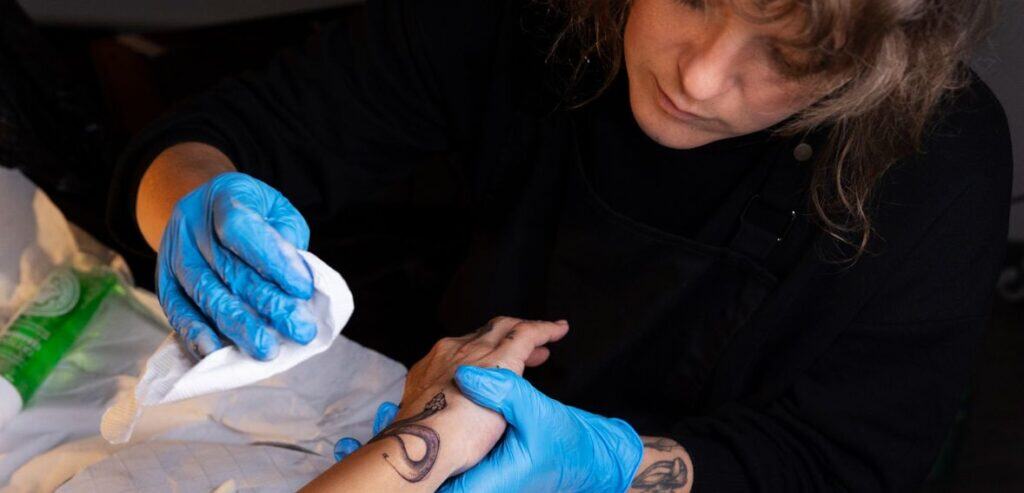
In tattooing, trust is crucial. Clients trust artists with their skin—and frequently their stories—expecting both skill and security. This trust improves when aftercare products are included in the service. Clients are more inclined to follow directions when artists suggest a soap or balm because they trust the artists expertise.
Both parties benefit from this trust: clients are assured of the final result, and artists are certain that the tattoo will heal appropriately, protecting their reputation. Customers eventually start to connect the store with both excellent art and a dedication to their well-being. Long-term success in the tattoo business depends on generating referrals and repeat business.
In tattooing, trust is crucial. Clients trust artists with their skin—and frequently their stories—expecting both skill and security. This trust improves when tattoo aftercare products are included in the service. Clients are more inclined to follow directions when artists suggest a soap or balm because they trust the artist’s expertise.
Enhancing Customer Experience Through Convenience
Bundling allows a more effortless consumer experience in a time when convenience influences consumer behavior. Customers leave the store with everything they need for appropriate healing, rather than rushing to pharmacies or speculating about what to buy.
They save time, feel less anxious, and are more satisfied as a result. After a lengthy tattoo session, picture a client leaving feeling exhausted and overburdened. They don’t have to worry about finding products because the correct balm and cleanser are included in the package.
This degree of attention to detail makes a lasting impression. Convenience is incorporated into the brand identity from a business standpoint, establishing the store as one that anticipates and caters to customer needs beyond the chair.
The Emotional Power of Souvenirs
Merch is a memento of a significant event, not just clothing or stickers. Many customers use tattoos to commemorate significant events like birthdays, anniversaries, or life changes. They have something material to go with the artwork when they purchase branded items associated with the session.
Customers can commemorate and share their relationship with the artist or store by wearing a t-shirt or tote bag that becomes a wearable memory. Emotional resonance is produced, strengthening loyalty and raising the possibility of return visits.
Tattoo customers value a memento that prolongs the meaning of their visit, much like concertgoers purchase souvenirs to remember a performance. This emotional bond is what turns infrequent shoppers into devoted patrons who promote the store long after their visit is over.
Revenue Diversification for Shops
Tattoo shops often operate on tight margins, with earnings tied closely to artist schedules. Merch and aftercare sales provide an additional revenue stream that doesn’t depend solely on chair time.
Aftercare products especially generate consistent sales since every tattoo requires them. Merch, on the other hand, opens opportunities for creativity and brand building. From seasonal collections to collaborations with local artists, shops can expand their offerings while increasing revenue.
Bundling ensures these sales feel integrated, not forced. By diversifying income, shops become more financially stable, better able to invest in equipment, marketing, or artist development. This makes merchandising and aftercare not just optional add-ons but essential components of sustainable business models.
Bundling merch and aftercare products with tattoo services requires a seamless checkout process. Modern salon POS systems make it easier to track inventory, manage sales, and provide clients with a smooth payment experience.
Educating Clients While Selling
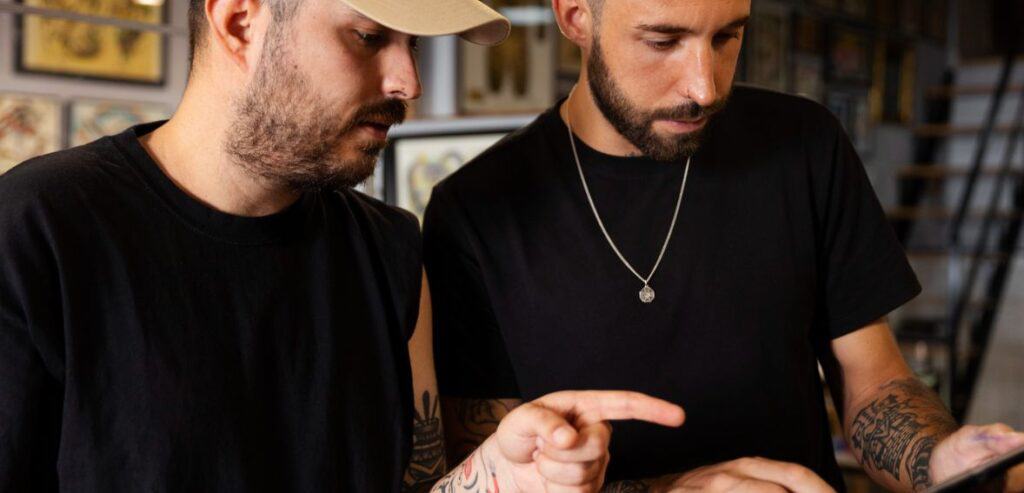
Bundling is most effective when presented as education rather than a marketing scheme. Customers frequently ask about product safety or healing when they visit tattoo parlors. Artists can walk clients through the process and explain the significance of particular aftercare items by providing bundled packages.
This turns the transaction into an educational opportunity, giving clients a sense of empowerment and knowledge. Credibility is increased by education, and customers are more likely to buy when they believe the advice.
They realize they are being taken care of instead of feeling like they are being sold to. In fields where trust and artistry are fundamental, this distinction is crucial. The shop’s position as a professional and artistic authority is reinforced by the educational strategy.
Building Loyalty Through Repetition
In tattooing, loyalty results from consistently satisfying experiences. Consistency is increased when a client is assured that they will always leave with a full care package and possibly even some goods.
They feel secure knowing that they are in capable hands because of this predictability. Loyalty encompasses the entire experience—the welcome, the session, the healing, and the memories—rather than just the tattoo’s quality.
Shops build a trustworthy full-circle experience for customers by providing bundles. This consistency eventually results in more reservations, recommendations to friends and family, and improved word-of-mouth advertising. Bundling is one of the simplest yet most successful loyalty-building techniques available in a sector where growth is driven by reputation and trust.
Leveraging Seasonal Opportunities
By leveraging seasonal trends, tattoo shops can optimize their bundling success. Bundles can be themed to fit the season around Valentine’s Day, Halloween, or Christmas. A limited-edition print or rose-scented balm could be included in a “Valentine’s Ink & Care Package” along with a tattoo.
Aftercare packages that prioritize sun protection for tattoo healing can be beneficial in the summer. The brand remains relevant throughout the year with seasonal merchandise, such as tank tops in the summer or hoodies in the winter.
This strategy keeps the store’s offerings interesting and novel while also increasing sales. Seasonal bundles are a smart way to keep customers coming back all year long, even when they aren’t scheduled for major tattoo appointments.
Collaborations with Local Artists and Brands
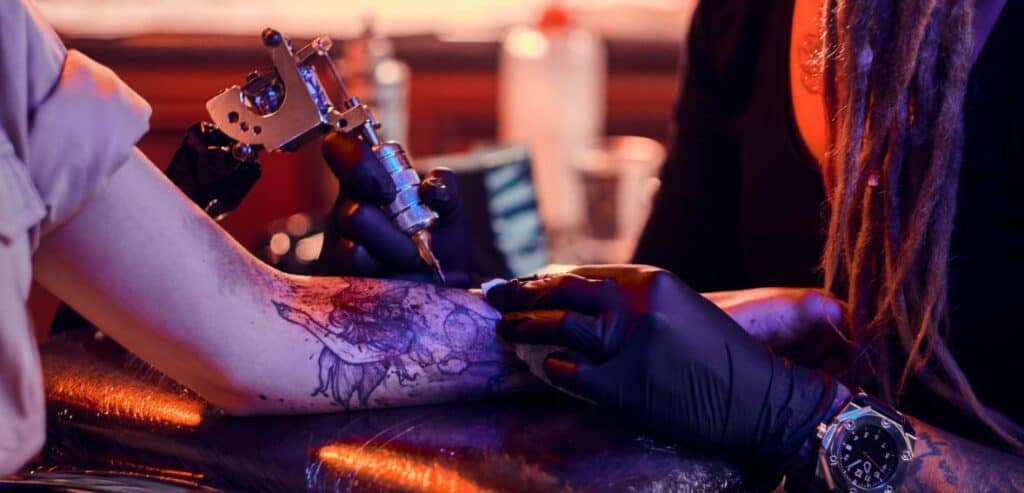
Enhancing merch and aftercare bundles through collaboration is a potent strategy. Local skincare companies and tattoo shops can collaborate to produce co-branded lotions, soaps, and balms for aftercare. In a similar vein, they can work with streetwear companies, illustrators, or fashion designers to create original product lines.
These partnerships build community ties, increase audiences, and create excitement. Customers appreciate the uniqueness of limited-edition goods, and cross-promotion helps both companies. Working together also emphasizes the store’s status as a creative center that offers more than just tattoos.
Customers believe they are supporting a greater cause when they see that their favorite tattoo parlor is in line with other nearby artists. These collaborations have the power to elevate simple bundles into cultural declarations that strengthen the studio’s brand and broaden its influence.
Pricing Strategies That Work
Bundle pricing requires careful balancing. If prices are too high, customers might be hesitant; if they are too low, stores lose out on possible revenue. Making something that feels more valuable than the sum of its parts is crucial.
For example, it may cost $30 to sell soap and aftercare balm separately, but it seems like a good deal to bundle them with the tattoo appointment for $25. Additionally, merch bundles can be tier-based, with premium packages containing several items.
Pricing transparency is essential because it lets customers know they’re being offered convenience rather than coercion. Bundles become simple options when prices reflect perceived value. By demonstrating fairness and consideration in each offer, effective pricing strategies not only boost revenue but also improve customer satisfaction.
Training Staff for Effective Bundling
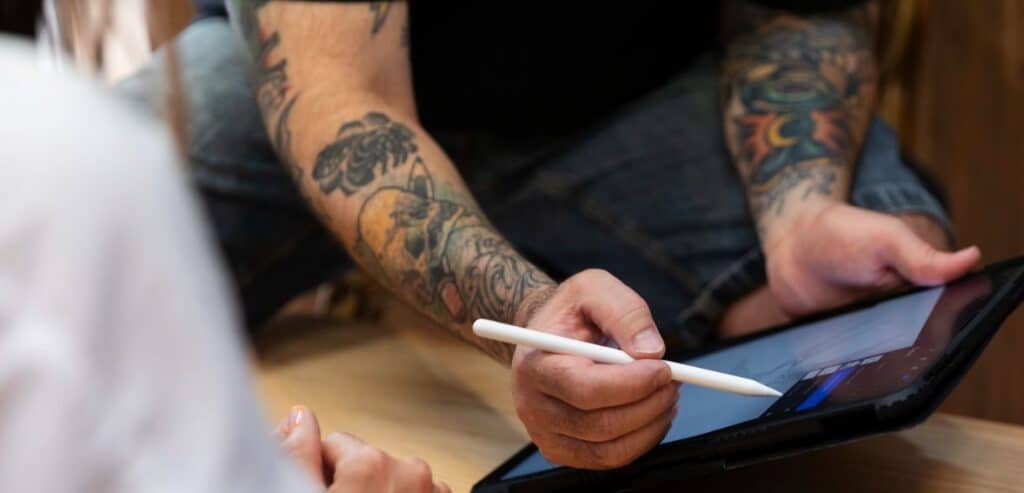
Successful bundling greatly depends on the artists and staff. Without effective communication, customers might undervalue merch and aftercare. Sales feel genuine when employees are trained to offer bundles organically, as a part of the customer journey.
Staff should concentrate on education rather than pushy sales strategies, explaining why the balm aids in healing, how the soap avoids irritation, and what the merchandise stands for. Staff members can rehearse these discussions until they feel comfortable using role-playing and scripting.
Additionally, incentives can encourage employees to consistently recommend bundles. Skilled staff make bundling a smooth aspect of the experience, making sure each customer feels valued and increasing sales for the store. Ultimately, how clients view the value of the offer is directly influenced by the confidence and expertise of the staff.
Marketing Bundles Online and Offline
Promoting bundles requires effective marketing. By sharing images of aftercare kits, limited-edition merch, or customer reviews praising the convenience of packages, tattoo parlors can use social media to highlight their bundled offerings.
Promoting bundles on the store’s website or when making an online reservation encourages customers to add them before they arrive. In the actual store, attention-grabbing displays can be found close to the front desk or tattoo stations. Purchases are made simple by signage, posters, or even QR codes that provide bundle details.
Flyers in nearby businesses are an example of offline marketing that helps spread the word. Shops can make bundles a key component of their brand by treating them as signature offerings. Effective marketing makes sure that bundles are proudly displayed as a part of the store’s culture rather than feeling hidden.
Conclusion
Bundling merch and aftercare with tattoo services is more than a sales tactic—it’s a way to extend the artistry, care, and trust that define a great studio. Every tattoo tells a story, and bundles ensure that story doesn’t end when the session does.
From personalized aftercare kits to wearable merch, these offerings deepen the bond between artist and client while generating new revenue streams. They transform a tattoo from a single appointment into an ongoing experience.
As trends shift toward holistic customer journeys, bundling stands out as a strategy that unites creativity with business sense. Tattoo shops that embrace this approach not only elevate their brand but also build loyalty, sustainability, and long-term success in an increasingly competitive industry.